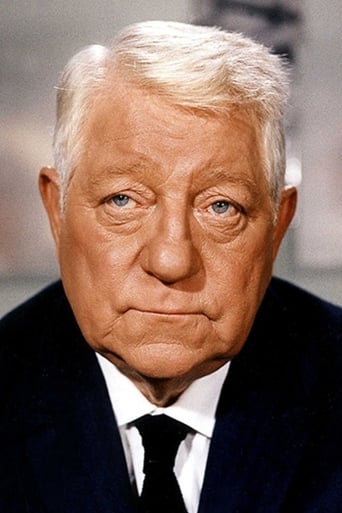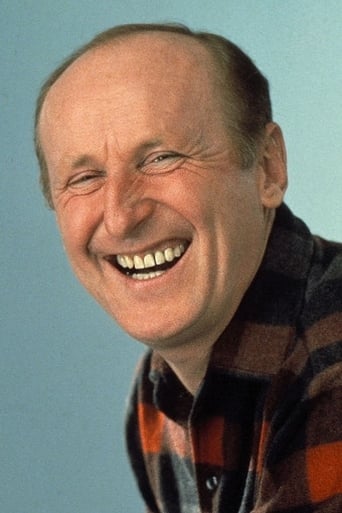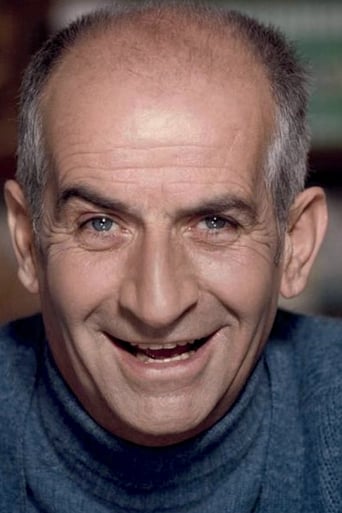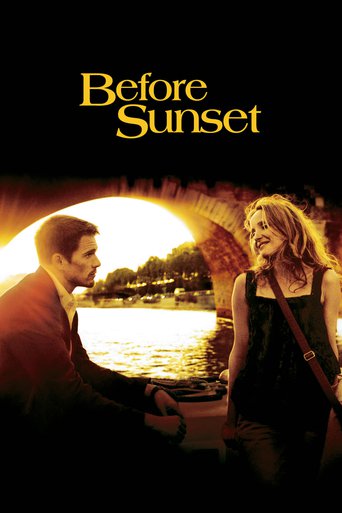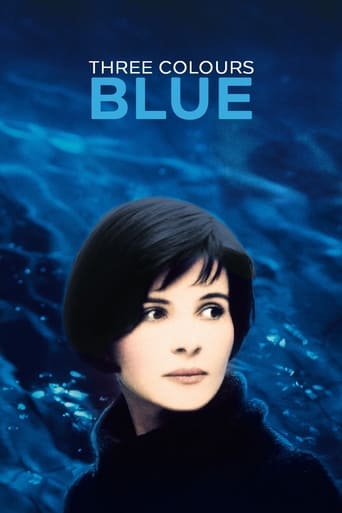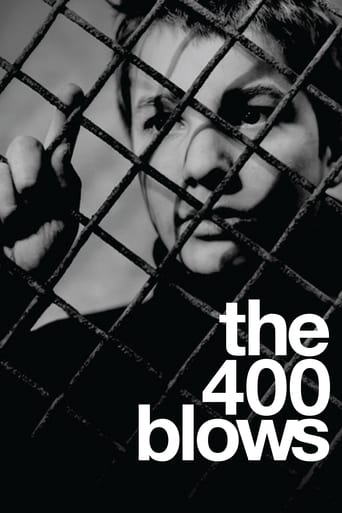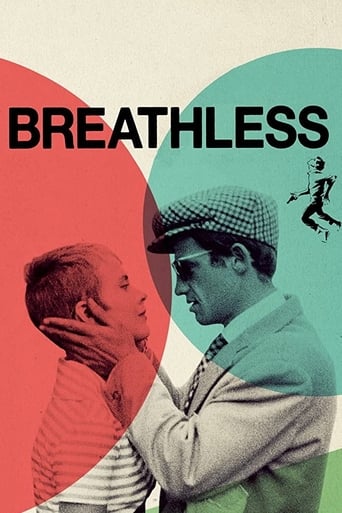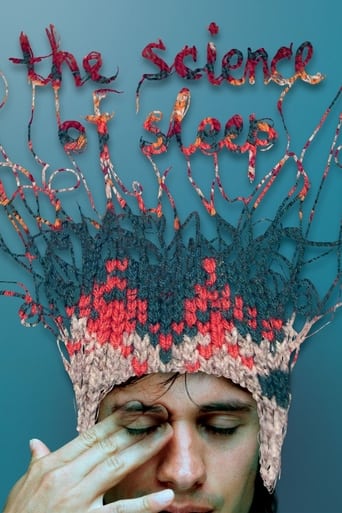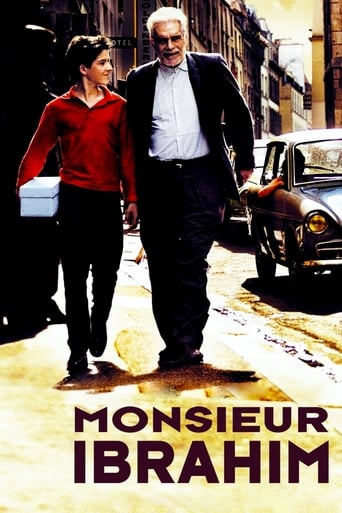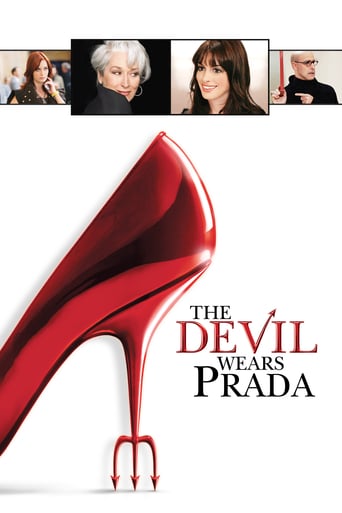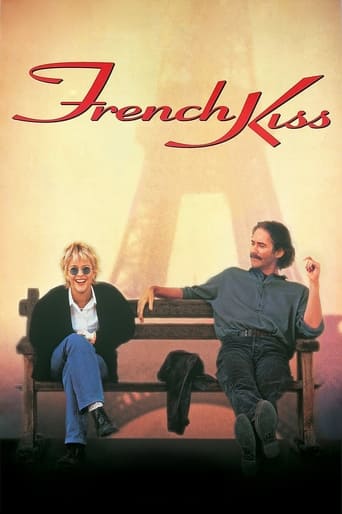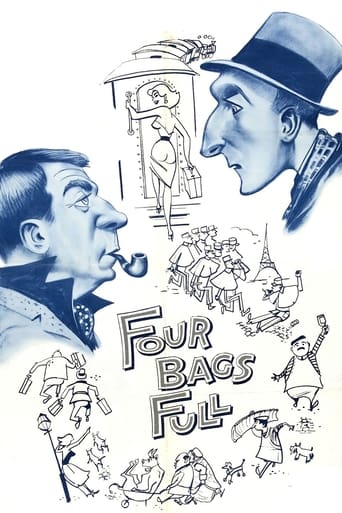
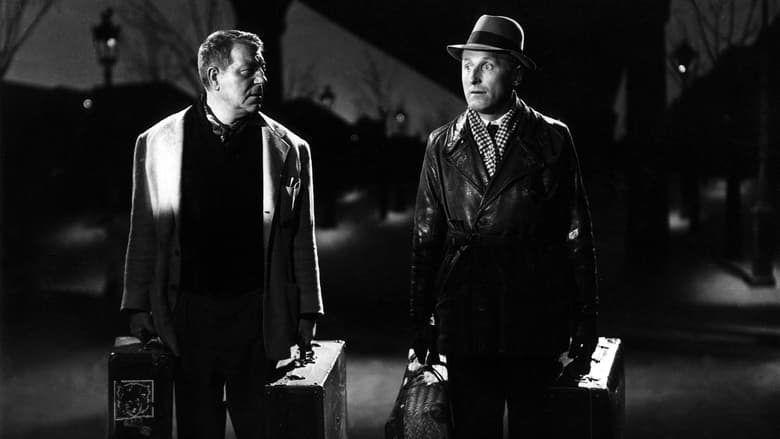
The Trip Across Paris (1956)
Two unlikely companions must smuggle four suitcases filled with contraband pork across Nazi-occupied Paris.
Watch Trailer
Cast


Similar titles
Reviews
Lack of good storyline.
everything you have heard about this movie is true.
Very interesting film. Was caught on the premise when seeing the trailer but unsure as to what the outcome would be for the showing. As it turns out, it was a very good film.
The story, direction, characters, and writing/dialogue is akin to taking a tranquilizer shot to the neck, but everything else was so well done.
Jean Gabin and Bourvil star in this film set during the German occupation. During this time, everyday items were often impossible to get and the black market, though very illegal, was the only way to get things like fresh meat and soap. The two stars of this film spend the evening trying to smuggle four suitcases full of pork through the streets of Paris without the Nazis catching them. Not the noblest of enterprises, I must admit.The reviews for "Four Bags Full" are extremely favorable--and have ratings that mostly fall in the 8 or 9 range. Because of this, my sights were set very high with this film. This, combined with my love of French films, made me think I'd really like this film...but I didn't. I only found it passable and, most importantly, I kept having trouble staying awake as I watched. I guess I just don't see things the way others do when it comes to this movie. I found the plot sluggish and much of Gabin's behaviors through the film just didn't make a lot of sense. I also strongly believe the film played much better long ago...when memories of the occupation and rationing were still quite fresh.
I think it is a mistake to categorize "La Traversée de Paris" as a comedy, for despite its light-hearted tone, the casting of two comedic giants, one already established: Bourvil and a newcomer soon to be the King of Comedy: Louis de Funès, despite an extraordinarily smile-inducing performance of a no less colossal actor : Monsieur Jean Gabin, there is more gravity, fatality and ubiquitous sensation of danger in Claude Autant Lara's masterpiece than any archetypal war drama. And never are the laughs triggered by funny situations but funny reactions from rather dramatic situations. We laugh first and think after."La Traversée de Paris" was released in 1956, a decade after World War II. Paris hadn't changed much and people still had vivid memories of these dark years that followed the defeat in 1940. When France ceased to belong to French, the country was economically a slave for Germany while morally, French people were entrapped in a never-ending torment: the bitterness of having lost war, freedom, and the faith on a brighter future. It was indeed, as they say now, the 'darkest hours of French history', and it's only fitting that the movie takes place during the night, to accentuate the black-and-white hypnotic photography. Darkness is omnipresent when memories from WWII are revived, from "Night and Fog" to "Army of Shadows".In fact, darkness is almost a protagonist for during the Occupation, it helped many good people to hide from the Germans or French Police. It was a time where French used their resourcefulness when ration tickets weren't enough. The darkest hours saw the rise of the black market. After all, when the dignity of a whole country was traded for peace, when the government has betrayed the honor of France, many French didn't feel like owing anything to the power, it's less heroism than pragmatism, yet from our perspective these men and women were brave because they jeopardized their lives and could easily say one word too many to a friend of the Germans, a collaborator, as they say.And the opening sets the tone, Marcel (Bourvil) and Mariette (Jeannette Batti) enter a bar, they learn that a black market partner was arrested because he trusted someone and told him he sold soap, he was then arrested. Speaking of soap, a painter named Grangil (Gabin) comes to the bar and needs to wash his hands, the bartender tells him that there's no soap as if there was enough trouble with it already. Police officers come and ask a client if his hands are dirty, coal has been stolen, Martin's girlfriend understands and discreetly gives Grangil a bar of soap. Everything is put together in that introducing sequence: solidarity, suspicion and betrayal. And if Grangil is brave enough to smuggle coal, maybe he'll make a good replacement to Martin's partner.Grangil accepts to cross the town with luggage full of pork parts, avoiding Police and Commandantur. The journey starts and there's something so exhilarating in Gabin and Bourvil's performance that we enjoy first the film for what it is, a superb demonstration of what the Golden Age of French cinema was. Gabin who gained a little weight and gray hair was still looking fairly young and he who used to be so restrained and cold is more grandiloquent than Bourvil who's generally the funny guy but here plays the straight man. It's as if Gabin enjoys post-war life again and can finally inject the relief of the peace in his performance and even vent his passion against the cowards in two marvelous scene.The first one is when he raises the prices of the mission, asking for more and more even though Jambier the butcher says yes from the beginning. Out of his lungs, he screams the name of Jambier, of the street he lives in, and asks for money where a disoriented Bourvil wants to shut him out. The scene is perhaps the noisiest of French cinema. Gabin is noisier than De Funès and funnier than Bourvil but the two stars take the distance with him, at that point, it's Cinema, all the genius of French Cinema finally imploding for laughs and simple laughs. But then right after comes the other powerful moment, with Gabin's rant, and boy, was he great at ranting, toward an old bartender and his clients who wanted to get them out from the bar when they felt something suspicious with two men carrying big luggage.They were coward enough to denounce them and not to even take a chance and the luggage with an infuriating Gabin delivered one of the most powerful monologues of French cinema incriminating all the little guys who think they're better than the others but don't even make an effort to be decent, he insult their ugliness , physical and moral and conclude his diatribe with an immortal "salauds de pauvres", literally " which would e translated as "you rotten poor". Marcel Aym's script has never sounded so incisive, so politically correct yet so humanly correct at these time were courage was a luxury. This is Gabin show, and he carries the film as confidently and strongly as he does for the luggage, Bourvil and De Funès will have their stars shining in many films to come, but the reason to watch the film is to admire Gabin.What he stands for in terms of masculinity and principals and moral values. Now, you have a French President claiming "I don't like the rich", which sounds so fake, so popularity-seeking,, so forgettable when a fictional Gabin treated the poor as rotten, it sounds real and eternal. This is how low things has sunk. "La Traversée de Paris" is a reminder that sometimes, it's the darkest hours that allow the brightest souls to shine.
Claude Autant Lara was an important film maker of what is known as "old style French cinema". After "Douce", it is one of his most famous films. This film is a good portrayal of all the qualities good or bad with which a French person would like to associate. No aspect of human behavior is left untouched. There is greed, seduction, fear, optimism etc. Much of the film's brilliance is due to its simple style. There is not much of dramatization and what viewers see is a display of pure acting. The two major roles are played by Jean Gabin and Bourvil. As the film is set in Paris, viewers get an unbiased visual depiction of one of the most beautiful cities. If there are people who might not like it, it must be Nouvelle vague people. As they were experimenting with their own cinema, they decided to ignore what they called "cinema of quality". The best thing which has been portrayed in this film is that after the end of the war people lived happily. This is an indication of optimism in this film.
I saw this film on a high school French field trip to the French Institute in New York. I had heard good things, but I must say that this movie does have its good moments, but overall there is not much to be gained.Plot summary: Two men, a high-strung taxi driver and a smooth-talking painter, team up as an unlikely pair smuggling black market pig's meat in four suitcases across Paris to be sold for a large sum of money during the German occupation of France in WWII.The camera-work is generally excellent as well as the acting, especially Borville ( after all, they're French ) but the biggest problems are the minor details. There are a few scenes that leave you feeling that they could've been planned, executed, and/or edited more effectively. Then again, there are a few scenes that are excellently planned, executed, and/or edited effectively.Then there's the ending. Oi, if you thought The Return Of The King could've used some trimming, even if this ending is nowhere near as long, you'll know what needs to be removed when you see it. It's illogical, historically incorrect, and almost ridiculous. But it's French, so maybe it works.From a modern perspective, it's a difficult movie to connect with. Although it does function as a period film, much of its relevance to today is virtually nonexistent. And much of the dialogue is cut during the English subtitling, so unless you're fluent in French, it'll be difficult to pick up on certain details. Overall, it's not a bad movie by any means, but it does leave much to be desired.


